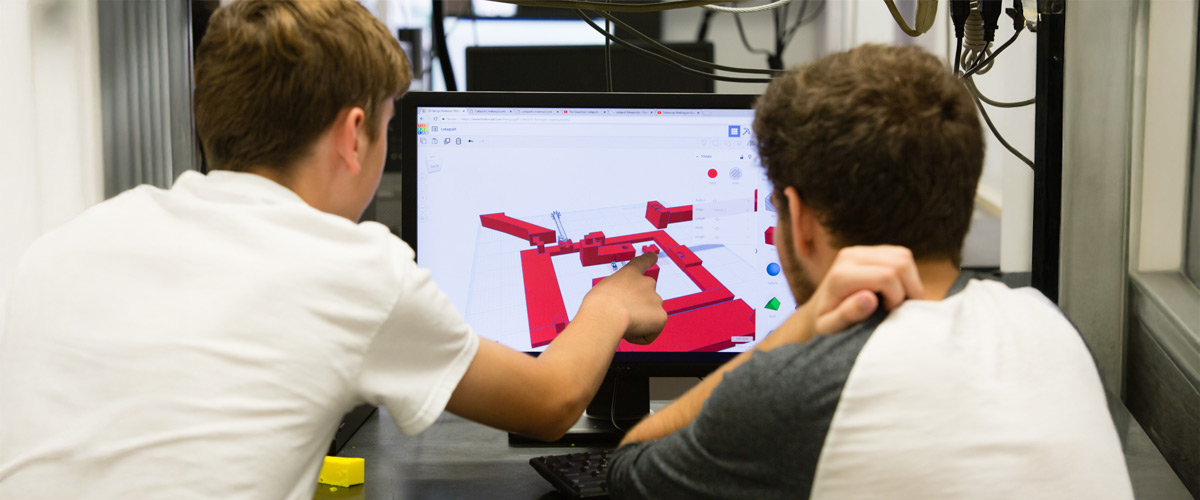
High School Summer Maker Academy
New York Tech’s High School Summer Maker Academy is the ultimate destination for high school students (ages 14-18) looking to explore the intricacies of technology and expand their skill sets. This summer, we offer two unique programs designed to allow students to address the challenges of climate change as outlined in the UN Sustainability Goals for promoting “peace and prosperity for people and the planet.”
Program 1: Clean Water & Sanitation
UN Sustainability Goal #6: Ensure availability and sustainable management of water and sanitation for all.
Project: Water delivery vehicle challenge.
Session 1 – Completed
When: July 21 – 25
Time: 10 a.m. – 4 p.m. (daily)
Where: Long Island campus
Session 2
When: August 11 – 15
Time: 10 a.m. – 4 p.m. (daily)
Where: New York City campus
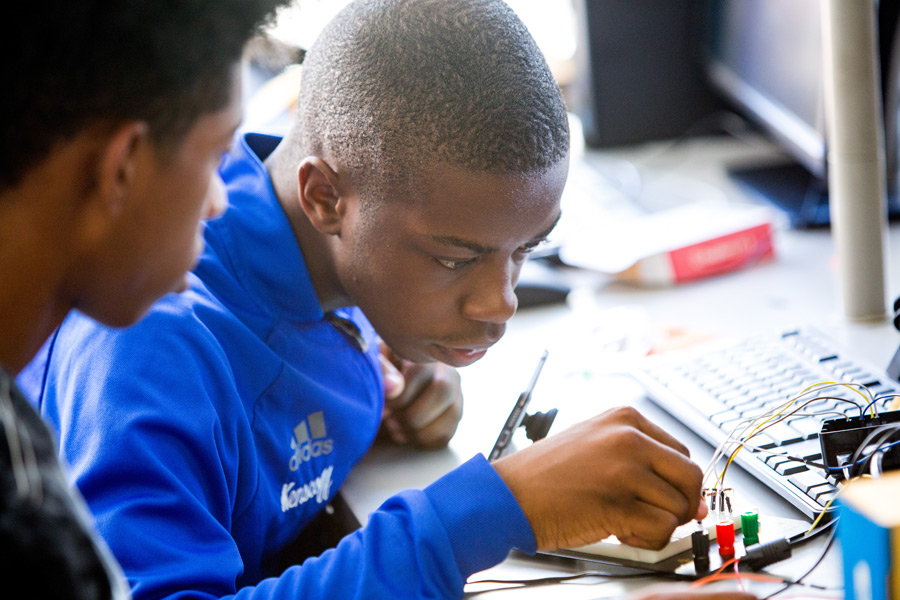
For billions of people, safely managed drinking water, sanitation, and basic hand-washing stations remain out of reach. A lack of adequate water also endangers animal species and wetland areas.
During this weeklong program, students will work in teams to design, develop, and build a vehicle that can deliver clean water to water-stressed areas of the world. This project directly addresses the challenge of UN Sustainability Goal #6: “to ensure availability and sustainable management of water and sanitation for all.”
Using skills learned in 3-D modeling, 3-D printing, laser cutting/engraving, PCB design, soldering, and Arduino programming, students will create a vehicle designed to autonomously and remotely navigate a unique, obstacle-laden, artificial landscape to deliver water from the distribution facility to a remote town/city/village.
Don’t worry, our instructors and team coaches will be there to help as you take your project from concept to reality. On the final day of the program, teams will present their completed, operational vehicle and compete against the other teams for the title!
Program 2: Sustainable Cities and Communities
UN Sustainability Goal #11: Make cities and human settlements inclusive, safe, resilient and sustainable.
Project: Smart City building design challenge.
Session 1 – Completed
When: July 28 – August 1
Time: 10 a.m. – 4 p.m. (daily)
Where: Long Island campus
All people should have access to a safe and clean living space, local transportation, clean air, and open public spaces. Unfortunately, many communities lack these basic needs.
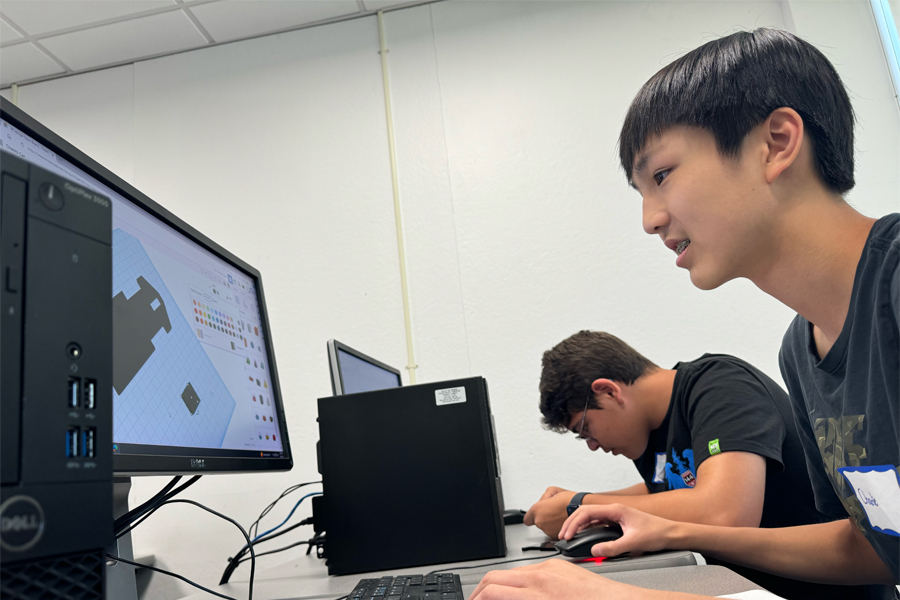
During this weeklong program, students will be challenged to work as a cohesive team to design and build a tech-infused, environmentally friendly, low-impact “Smart City.” The Smart City must meet the main objectives found in UN Sustainable Development Goal #11: “Make cities and human settlements inclusive, safe, resilient, and sustainable.”
Employing skills learned in 3-D modeling, 3-D printing, laser cutting/engraving, PCB design, soldering, and Arduino programming, and guided by our instructors and team coaches, students will work in teams to design, develop, and build separate structures that will have minimal impact on the environment while maximizing the comfort and safety of the occupants.
On the final day of the program, teams will present their structures and showcase their integration into a completed and operational small-scale Smart City.
In addition to the main Smart Building challenge, there will also be individual and team-based mini-challenges and mini-projects throughout the week to build your skills, win prizes, and further prepare you for the main Smart Building design challenge.
To Apply
Parents must complete and return all the following forms before the deadline to finalize the application:
- Behavioral Conduct Consent Form
- Consent for Evaluation Form
- Media Consent Form
- Medical History Release form (must be filled out by healthcare provider)
Application Deadline: May 6, 2025
NOTE: Registration is on a rolling basis. Each program session only accepts 20 students. Once the program has reached capacity, you will be put on a waiting list.
Registration Details
Cost
- Program cost: $250, per program/per session
- Payment due: Upon acceptance into the program.
- Payment deadline: June 2
Meet the Instructors
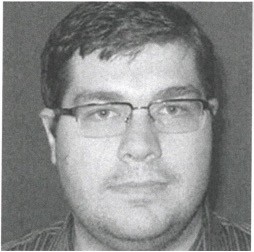
Christopher Springston
Christopher Springston is the assistant director for graduate admissions in the College of Engineering and Computing Sciences at New York Institute of Technology. He has a Bachelor of Science in Electrical Engineering from Rensselaer Polytechnic Institute and a Master of Science in Electrical and Computer Engineering from New York Tech. He has an FE Electrical and Computer Engineering Certification from the state of New York and an AutoCAD Certification from the American Institute of Architects.
Springston works as a graduate advisement specialist on New York Tech’s Long Island campus, where he advises new and continuing graduate students in the computer science, electrical and computer engineering, cybersecurity, and data science programs. He is also an instructor for undergraduate programs and currently teaches Career Discovery, a course geared toward providing incoming first-year students with the skills and tools necessary for an engineering career.
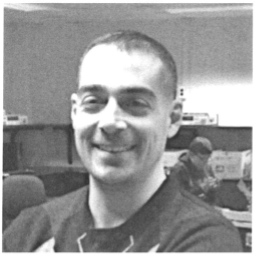
Saverio Marsicano
Saverio Marsicano is the senior lab engineer for the College of Engineering and Computing Sciences at New York Institute of Technology. With more than 10 years of college-level teaching experience, Marsicano assists students in the engineering lab with the implementation of their design projects and lab experiments. He currently maintains more than eight engineering labs, plus the Data and Cyber Centers, where faculty perform research.
Marsicano holds a master’s degree in electrical and computer engineering and a bachelor’s degree in electrical engineering from New York Institute of Technology. He has taught courses at the university in Career Discovery, Fundamentals of Digital Logic, Electrical Circuits, Engineering Tools, and Electronics Laboratories.
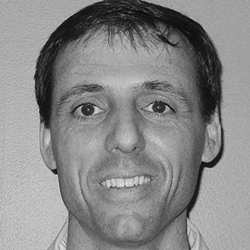
David Fanning
David Fanning is a laboratory engineer in the College of Engineering and Computing Sciences at New York Institute of Technology. He holds a Bachelor of Science in Mechanical Engineering and a Master of Science in Mechanical Engineering from Stony Brook University. He is EPA 608 Universal Certified to work on Type I, 11, and 111 stationary refrigeration equipment. Over the past 18 years, his career has included architecture, manufacturing, professional educational training, management, and teaching in higher education.
He is the lab engineer in the Mechanical Engineering department at New York Tech, managing the mechanical engineering student machine shop and student lab areas. He has taught at the college level as an adjunct professor in Career Discovery, Graphical Design (AutoCAD), Thermo-Fluids, Automotive Chassis Systems, Applied Mechanics and Engineering Materials, and Quality Management. He is also the advisor for the university’s Society of Automotive Engineers (SAE) student organization.